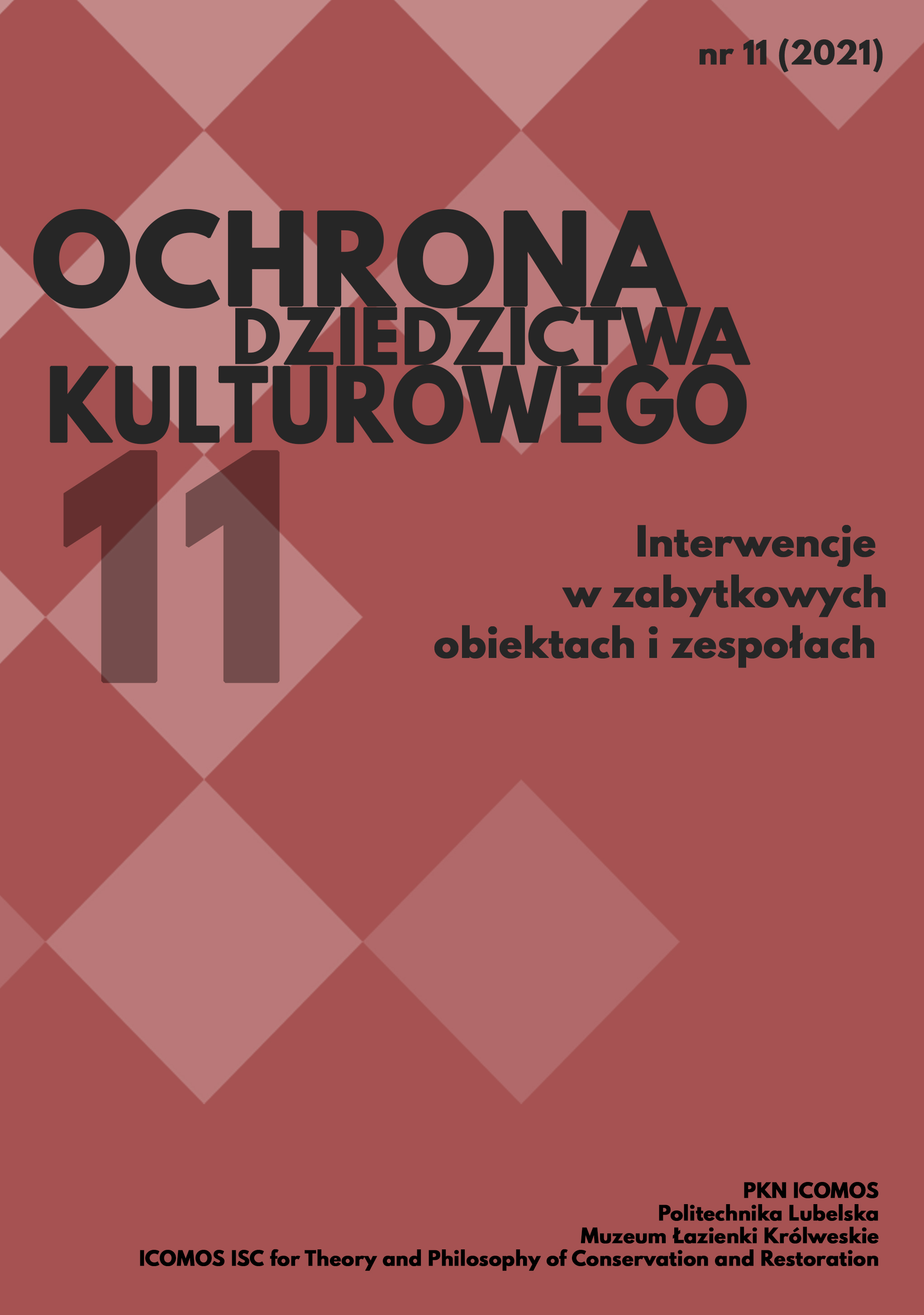Tenement House "Pod Kruki", Market Square 25, Krakow. The Present of History – the Layering of the Future
Article Sidebar
Issue No. 11 (2021)
-
Letting Go: the Limits of Intervention
Grzegorz Bukal1-12
-
Transformation of Historic Buildings – an Attempt at Codification
Piotr Molski13-26
-
Problems of Protection of Historical Industrial Buildings on the Example of the Port and Shipyard Complex in Gdynia
Robert Hirsch, Celina Łozowska27-42
-
New Old Town in Elbląg – Multi-faceted Intervention in a Historic Area
Katarzyna Wiśniewska43-64
-
Urban Conservation in International Charters: From the Athens Charter to the Historic Urban Landscape Recommendation
Antonino Frenda, Marco Valle65-74
-
Integrity versus Intervention Boundaries in Modernist Housing Complexes
Case study of the healt/holiday districts in UstrońBłażej Ciarkowski75-86 -
São Luiz do Paraitinga: The Image of São Paulo State in the 18th Century
Rogério Pereira de Campos, Maria Fernanda Rodrigues, Anibal Costa, Humberto Varum87-105
-
Tenement House "Pod Kruki", Market Square 25, Krakow. The Present of History – the Layering of the Future
Marcin Włodarczyk, Małgorzata Mariola Włodarczyk107-126
-
The Latest Strategic Documents Specifying Changes in the Approach to the Modernization of Monuments in Poland
Katarzyna Pałubska, Katarzyna Zalasińska127-142
-
Parks, Gardens and Other Forms of Composed Greenery – Boundary Conditions for Contemporary Interventions
Dorota Sikora143-160
-
Criteria to Be Met by Contemporary Design Works Transforming the Form and Utility Program of Historic Sacred Architecture in the View of Selected Examples from Europe
Konrad Szumiński161-170
-
Analysis of the Component Values of the Historic Urban Complex – the Basis for Conservation Programs and Plans
Boguslaw Szmygin171-179
-
ICOMOS Heritage Impact Assessment – Application to National Conservation Practice
Marcin Górski181-199
Main Article Content
DOI
Authors
malgorzata@wpluswarchitekci.com.pl
Abstract
Architecture is the art of building, that is, gathering durable materials and agglomerating them in such a way as to produce a work that is durable, functional, and beautiful (as described by the Vitruvian triad: firmitas, utilitas, venustas). The completion of construction marks the beginning of the building's duration. The duration of architecture almost always involves making changes. It would be wonderful to let architecture last indefinitely, with its original shapes, textures, and materials preserved. Technical progress, changes in needs, natural and historical accidents, and many other factors make it necessary to introduce changes in the object. Persistence of architecture is a constant change and it is good if they are created by EVOLUTION.
Layering is like writing a book, page by page. It then allows you to "read" the architecture and with it the history of the place and the people. Layering is more interesting than exchanging. The loss in the case of replacement is that the previous stage that was removed, whether by disaster or intentionally, is like a page torn out of a book. A modern intervention in a historic building must respect the previous pages, the previous layering. Sometimes it can even fill in some missing pages or rather point them out. The wise course of action in such a case is not guided only by the orders of conservation services. Empathy for architectural/book records is a challenge for creators, especially architects. We will show such a process on the example of the tenement house number 25 Market Square in Krakow, which is an example of careful modernization of structure and space while preserving legible traces. It is also a nod of the present to the future of the new spirit of this space.
Keywords:
References
Ashworth G., Planowanie dziedzictwa, Kraków: Wydawnictwo MCK, 2015.
Dyba O., Kraków. Zabytki architektury i budownictwa, Warszawa: Krajowy Ośrodek Badań i Dokumentacji Zabytków, 2007.
Komorowski W., Sudacka A., Rynek Główny w Krakowie, Kraków: Ossolineum, 2008.
Le Goffn J., Historia i pamięć, Warszawa: Społeczny Instytut Wydawniczy „Znak”, 2015.
Łukacz M., Średniowieczne domy lokacyjnego Krakowa, Czasopismo Techniczne. Architektura 7-A/2011 Zeszyt 23, ss. 67–98.
Marcinek R., Kraków, Kraków: Wydawnictwo Ryszard Kluszczyński, 2001.
Molski P., Adaptacja – formy i uwarunkowania, Współczesna myśl architektoniczna w adaptacji obiektu zabytkowego, czyli charakterystyka optymalnej ingerencji dla potrzeb nowej funkcji, [w:] B. Szmygin (red.), Adaptacja obiektów zabytkowych do współczesnych funkcji użytkowych, Warszawa–Lublin: Wydawnictwo Politechniki Lubelskiej, ss. 87-97.
Motak M., Historia rozwoju urbanistycznego Krakowa w zarysie, Kraków: Politechnika Krakowska, 2012.
Purchla J. (red.), Metamorfozy kamienicy „Pod Kruki”, Kraków: Wydawnictwo MCK, 2009.
Purchla J. (red.), Rynek Główny 25. Dzieje jednego adresu, Kraków: Wydawnictwo MCK, 2020.
Stachowski A. H. (red.), Encyklopedia Krakowa, Kraków: Wydawnictwo Naukowe PWN, 2000.
Szmelter I., Nowe rozumienie dziedzictwa kultury; implikacje dla wartościowania, [w:] B. Szmygin (red.), Wartościowanie w ochronie i konserwacji zabytków, Warszawa–Lublin: PKN MROZ ICOMOS, 2012, ss. 219-232.
Tatarkiewicz W., Dzieje sześciu pojęć, Warszawa: Społeczny Instytut Wydawniczy „Znak”, 2005.
Tunbridge J., Zmiana warty. Dziedzictwo na przełomie XX i XXI wieku, Kraków: Wydawnictwo MCK, 2018.
Witruwiusz (tł. Kumaniecki, K.), O architekturze ksiąg dziesięć, Warszawa: Prószyński i S-ka, 1999.
Włodarczyk M., Współczesna myśl architektoniczna w adaptacji obiektu zabytkowego, czyli charakterystyka optymalnej ingerencji dla potrzeb nowej funkcji, [w:] B. Szmygin (red.), Adaptacja obiektów zabytkowych do współczesnych funkcji użytkowych, Warszawa–Lublin: Wydawnictwo Politechniki Lubelskiej, 2009, ss. 203-208.
Włodarczyk M., Wartość zabytku – pamięć, teraźniejszość i nowa funkcja a ekonomia wobec architektury powojennego modernizmu czasu PRL-u, [w:] B. Szmygin (red.), Wartość funkcji w obiektach zabytkowych, Warszawa: PKN ICOMOS, 2014, ss. 315-324.
Article Details
Abstract views: 547
License

This work is licensed under a Creative Commons Attribution-ShareAlike 4.0 International License.






